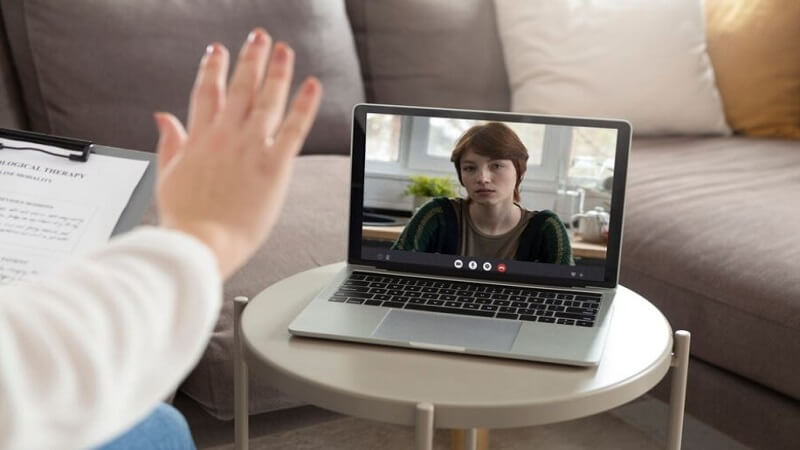In recent years, online therapy sessions have gained immense popularity, especially with the convenience they offer to individuals seeking mental health support. But an important question lingers: Can online therapy truly replace traditional counselling? With the rise of digital platforms, therapy has transformed, but the comparison between virtual and face-to-face counselling remains crucial.
This topic holds importance as more people turn to online options, especially during the pandemic and beyond. Understanding the strengths and potential limitations of online therapy is vital for those considering it as a replacement for traditional counselling.
The Shift to Online Therapy
The growing availability of online counselling services has made therapy more accessible, eliminating geographic and time constraints. Instead of commuting to a therapist’s office, individuals can connect with a licensed online psychologist from the comfort of their home. This shift has been particularly beneficial for people living in remote areas or those with busy schedules who might not otherwise have access to quality mental health care.
Benefits of Online Therapy
Convenience and Flexibility: Online therapy allows individuals to schedule sessions that fit their lifestyle. Whether early morning or late evening, therapy is more flexible when conducted virtually. This is particularly advantageous for individuals juggling work, family, and other commitments.
Accessibility for Remote Areas: For people living in rural areas or countries with limited access to mental health services, online therapy has been a game-changer. They can access specialists across the country or even globally without the need to travel.
Anonymity and Comfort: Some individuals feel more comfortable discussing personal issues from the safety of their own space. Online therapy reduces the stigma of entering a clinic and may make it easier for people to open up.
Affordability: Many online therapy platforms offer more affordable rates than traditional face-to-face sessions. This has made therapy accessible to a wider population, allowing more people to benefit from professional help.
Limitations of Online Therapy
While online therapy in India and other parts of the world has seen massive growth, it’s essential to acknowledge its limitations.
Lack of Physical Presence: In traditional counselling, non-verbal cues such as body language play a significant role in understanding a client’s emotional state. Online therapy can make it challenging for therapists to read these cues accurately, especially when sessions are conducted without video.
Tech Issues: The reliance on technology can lead to connectivity problems. A poor internet connection can interrupt the flow of a session and hinder effective communication, reducing the overall impact of therapy.
Suitability for Severe Cases: While online therapy works well for many mental health issues, it may not be the best option for individuals facing severe mental health conditions, such as schizophrenia or psychosis. In such cases, in-person interventions might be more suitable for intensive care and treatment.
Traditional Counselling: Why It Still Holds Value
Despite the convenience of online therapy, traditional face-to-face counselling remains irreplaceable in many ways.
In-Depth Interaction: In a physical setting, therapists can observe subtle emotional shifts, body language, and facial expressions, offering deeper insight into their client’s mental health.
Personalized Environment: The therapy space itself can create a calming, secure environment, which is sometimes hard to replicate in a virtual setting. The physical setting adds an element of ritual to the therapeutic process, which can enhance healing for some individuals.
Hands-On Approaches: Certain therapies, such as somatic therapy or techniques that involve physical touch or proximity, are only possible in a face-to-face setting.
Can Online Therapy Replace Traditional Counselling?
Online therapy has undoubtedly changed the mental health landscape, offering convenience, accessibility, and flexibility. For many people, it has provided a lifeline, especially during times when in-person sessions were not possible. However, whether it can fully replace traditional counselling depends on the individual’s needs, the severity of their condition, and their personal preferences.
For mild to moderate mental health issues, such as anxiety, stress, or depression, online therapy has proven effective. However, for those needing more intensive therapy or dealing with complex psychological disorders, traditional counselling might still be more appropriate. In conclusion, online therapy complements traditional methods rather than fully replacing them.
CONCLUSION
In conclusion, while online therapy offers numerous benefits, it may not fully replace traditional counselling for everyone. For individuals seeking flexibility and accessibility, online counselling is a valuable alternative. However, traditional therapy still holds an essential place, particularly for those needing more intensive or hands-on therapeutic interventions.
FAQs
- Is online therapy as effective as traditional counselling?
Yes, for many mental health concerns, such as anxiety, depression, and stress, studies have shown that online therapy can be as effective as in-person therapy. However, its effectiveness may vary depending on the individual’s condition and the type of therapy used. - Can I switch between online therapy and traditional counselling?
Absolutely! Many people use a combination of both approaches, depending on their needs. For example, someone might start with traditional therapy and transition to online sessions for convenience. - What are the technical requirements for online therapy?
You need a stable internet connection, a device with a camera (for video sessions), and a quiet, private space to conduct your sessions. Some platforms may require specific software or apps. - Are online therapy sessions secure and confidential?
Yes, reputable online therapy platforms prioritize client confidentiality. They use encrypted communication to ensure privacy, adhering to international privacy standards such as HIPAA (in the U.S.) and GDPR (in Europe). - Can I access online therapy in India?
Yes, online therapy is widely available in India, with many licensed therapists offering virtual sessions through various platforms. This has increased access to mental health services across the country.
